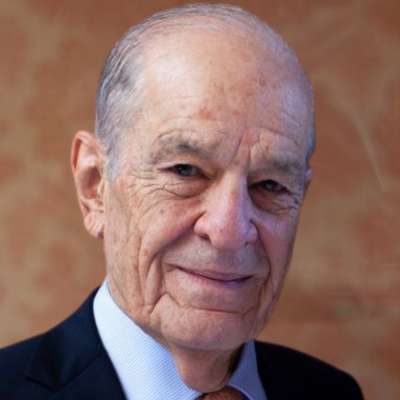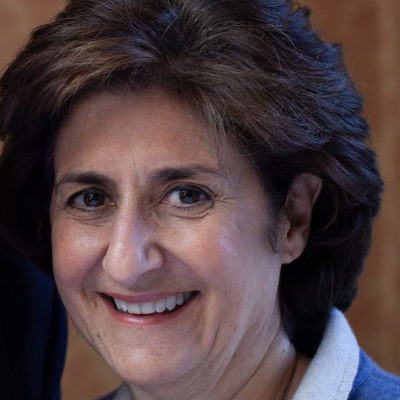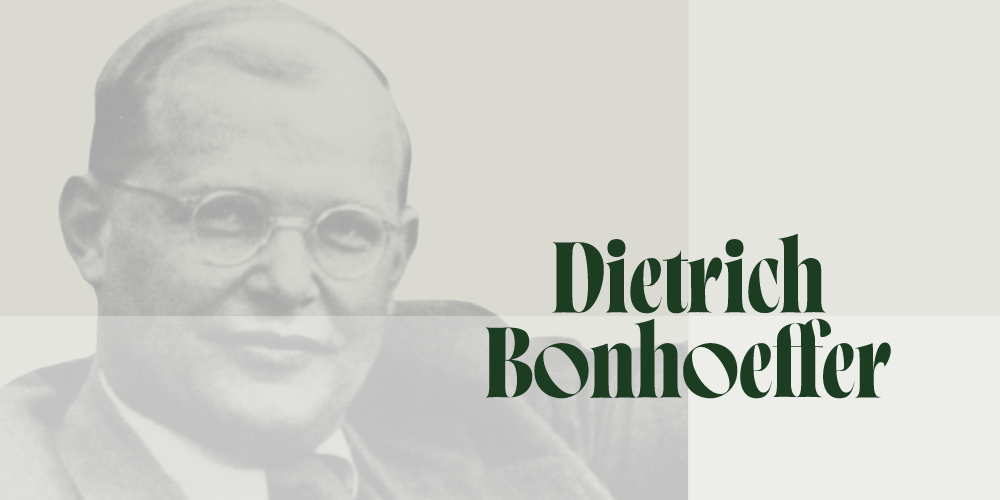Watch our introductory conversation about Dietrich Bonhoeffer, exploring his biography, theology, and his legacy for the church.
There will be renewed interest in the life of Dietrich Bonhoeffer this fall, as Angel Studios will be releasing the movie Bonhoeffer—Pastor. Spy. Assassin.
The film tells his story of being swept up into a plot to assassinate Hitler. It portrays his moral conflict as he wrestles with being faithful to Christ, while witnessing the great injustice of Nazi Germany. Vitally, it shows the significance that the Church ought to play in the midst of society—especially when society is bent towards evil. In great cinematic artistry, it asks, how far will you go to stand up for what’s right?



Full Transcript:
[00:00:05] Welcome
Benjamin Quinn: My name is Benjamin Quinn, Director of Partnerships for BibleMesh. I’m joined here by two friends and colleagues, Jacob Shatzer, the Executive Director of BibleMesh, and Dennis Greeson, the Dean of the BibleMesh Institute. Thanks for joining us.
[00:00:17] Who was Dietrich Bonhoeffer?
Benjamin Quinn: Dennis, we’re here to talk about a well known figure, Dietrich Bonhoeffer, start with just telling us who is Dietrich Bonhoeffer, why should Christians care, what kind of influence should he have? Just give us a bio to to start with.
Dennis Greeson: Bonhoeffer, uh, probably well known for books like Life Together, The Cost of Discipleship. He was a German theologian.
Uh, his legacy lives on today in shaping how we think about things like faith and culture, but specifically for the story that we want to tell, it’s the inspiration that Bonhoeffer gives us to pursue Christ deeply and with our full heart, our full mind, and our spirit, even in face of cultural chaos.
[00:00:55] What does Dietrich Bonhoeffer mean to you?
Benjamin Quinn: Jacob, in one sentence, what does Dietrich Bonhoeffer mean to you?
Jacob Shatzer: I think that what I appreciate most about Bonhoeffer is his academic expertise aimed at forming ministers for the church
[00:01:10] How did Bonhoeffer train ministers?
Benjamin Quinn: Dennis, tell us about that. So part of Bonhoeffer’s life is, uh, he was an academic. He was brilliant. His writings certainly have been influential, but he also was a seminary kind founder and teacher, and there was a particular way in which he went about theological training that people have been trying to recapture in many ways ever since. Speak to that a minute.
Dennis Greeson: Yeah, early in his career, he was definitely enchanted by the gospel, with Christ and faith, but it wasn’t until he went to the U.S and did seminary in Harlem, in a poor area and got to know the black church that he saw the significance of the church for shaping the faith.
Benjamin Quinn: Tell me more about that. So that’s a, also a really strident part of his own story. And I think how it affected him when he went back to Germany, what, what did the black church teach him?
Dennis Greeson: First, it awoke him to the, uh, the, the blindness that he had towards racial issues, towards social justice issues. He didn’t have, uh, really any framework for that, for how the Jews were treated under the Nazis in the 1930s, until he encountered the way that black Americans were treated in the U. S. in the face of, of Jim Crow era racial prejudice.
Not only did Bonhoeffer develop a passion for the justice that the gospel brings about in a society, he also saw the significance that the church ought to play in the midst of society, leading him to have found an underground seminary at Finkenwald, um, during the war. Uh, shaping pastors, not only by teaching them in the classroom, but by living together, playing sports together, worshiping, and taking the Eucharist together. All of that, uh, serving to form the context for the, the best way to shape people for the ministry of the gospel, together, face to face, living life.
[00:02:58] What does Bonhoeffer teach us about being faithful?
Benjamin Quinn: So Bonhoeffer, um, he’s an academic, pastor, perhaps was best known, at least by the people closest to him, as pastor in many ways, but also, uh, teaches us just everyday ordinary Christians about how to be faithful to the gospel in the midst of cultural chaos and real serious cultural dissonance and opposition to, Gospel truth and Christian teaching.
And here we are at BibleMesh, we, we are about trusted theological education. Bonhoeffer, we think is someone who is a real model for that in many ways. He wasn’t perfect, but at the same time, he, he has a lot to teach us in all of those areas. Jacob, I’d love for you to speak to that piece when it comes to how we think about shaping, um, and forming pastors, what do we learn from Bonhoeffer.
Jacob Shatzer: Yeah, well, I think one thing that we learn from Bonhoeffer is the centrality of Christ and everything that he’s writing and everything he’s doing, Christ is central, and I think sometimes, especially when it comes to cultural chaos, we can be tempted, or without realizing it, we can actually make the cultural chaos central, and then we try to occasionally bring Jesus to that, but for Bonhoeffer, Christ was always central in his writings and in the way he responded in the way that he lived, and so whatever was going on around him, he certainly paid attention to that. He certainly responded to that, but he did so in a way that always kept Christ central.
[00:04:20] How can The Cost of Discipleship help us today?
Benjamin Quinn: Uh, Dennis, you mentioned as well, one of his best known, maybe his best known book, The Cost of Discipleship. And this is someone who writes a book talking about counting the costs, and there’s reason for us to listen to him because he counted the ultimate cost, even dying for his commitment to the faith in this way.
When we think about cost of discipleship in relation to, uh, Dietrich’s life and then what we have to learn from that, part of your expertise is faith and culture. What might, how might we think about the cost of discipleship for Christians today?
Dennis Greeson: Perhaps the best, um, or the most powerful message of the cost of discipleship is the need to be formed into Christ’s image and let that be the standard, uh, by which we judge culture, our ethical actions, uh, Bonhoeffer was involved in the July 20th plot to try to assassinate Hitler, not because, um, Bonhoeffer was a war monger. In fact, he was the opposite. He was a pacifist for most of his life, but, uh, felt the need to be involved with ridding Germany and, uh, the Nazi influence across the world of that tyranny for the sake of Christ, uh, and justice for those who are oppressed by the Nazi regime.
[00:05:31] How does Bonhoeffer reconcile his faith and his actions?
Benjamin Quinn: Let’s speak about that for a minute. Sometimes, especially people who were martyred for the faith, um, sometimes we hold them up as though they had no blemishes, that they were perfect. And, and part of what the Course will bring out, and even if you’re just reading Bonhoeffer and know about his life, He was, he was deeply conflicted about some of these things. How do I respond to the Nazis? And you mentioned he was involved in the assassination plot of Hitler.
Talk to us a little bit about that. What’s going on in his heart? How is he sorting this out and how might we even learn something from that?
Dennis Greeson: Bonhoeffer is a complex figure. We don’t have a treatise where he, uh, walks through step by step how he got to the point that he did and why he justified it. Um, but we do see him wrestling with this. He was a pacifist early for, actually for much of his life. Um, the, the July 20th plot for him, um, Incrementally were, uh, he took steps to be a part of this because he saw the great injustice in society, and he also looked at Christ and saw that Christ took on great suffering and great evil for the sake of saving those that he loved. And so for Bonhoeffer, it was Christ’s example that helped ground and justify why he ought to do likewise to the people around him.
Benjamin Quinn: Jacob, some of your expertise is in Christian ethics. I’m curious how you respond to that question in light of Bonhoeffer.
Jacob Shatzer: Yeah, well, I think what’s really interesting about it is, you know, in the hindsight of history, it’s easy to look back and try to imagine why Bonhoeffer might have done what he did, especially depending on where Christians land themselves with regard to just war theory or pacifism. They’re own positions can shape where we look for the evidence in Bonhoeffer’s writings or how we weight the different things that he says. And I think what is important to remember with this is to recognize that the moral life isn’t always as clean as it can look in hindsight, that often the road of following Christ is one that is fraught with challenge, even as we seek to keep Christ central, even as we seek to honor Him in all that we do. I don’t know that Bonhoeffer himself was 100 percent with absolute certainty convinced that he was taking the right steps, and we shouldn’t always expect to be either before we seek obey.
Benjamin Quinn: Yeah, doesn’t this say something to us about just the reality of his own humanness as a pastor, as just an ordinary Christian, as a thought leader in many ways, as a theologian. He’s really conflicted about this , And as you said, Jacob, these life decisions are not so clean and simple. The book of Proverbs just gives examples of, if, um, if everything so black and white, we wouldn’t need wisdom and discernment for these things
[00:08:08] How does Bonhoeffer spend his time in prison?
Benjamin Quinn: Dennis, in Bonhoeffer’s life, one of the seasons of ministry that people remember most fondly is the time in which he’s in prison. Speak to, uh, a little bit about what he’s doing in that season and how he is seeking to not only be faithful to Christ in a difficult era, such as being in prison, knowing that there’s a good chance he’s going to die for his faith, but also how he ministered to people around him, even in prison.
Dennis Greeson: Yeah, we have his letters and his papers compiled and published as letters and papers from prison. They show us that he’s writing to his friends. He’s trying to shepherd his flock, but he also doesn’t stop with his deep, uh, original theological work. He’s articulating complex things and working through theological issues, even while in prison, perhaps as a way to survive, to keep his spirit and his mind alive. Um, but also because he’s passionate about shepherding the flock through articulating doctrines that they need to embrace and shaping their, their inner world as well as the world of their, their beliefs and ideas.
[00:09:11] Why an online course on Bonhoeffer?
Benjamin Quinn: Jacob, at BibleMesh, there’s a lot of things that we could be doing, and of course we have a lot of different ways in which we manifest the ministry of BibleMesh and trusted theological education. Why, why a course on Bonhoeffer?
Jacob Shatzer: Yeah, well, I think one of the key aspects that Bonhoeffer teaches us is that when it comes to the culture in Christianity or the culture in the Bible or the culture in Jesus, there are always places where the culture will run in parallel to what scripture teaches us.
I mean, there, there are God’s character is true and God reveals himself in general revelation as well. So pretty much any culture you can think of will have some elements that fit with what the Bible teaches. And sometimes as Christians, it can be really tempting to just emphasize those elements of our faith. We know we’re going to get applause when we emphasize the things the secular world also notices and applauds. But we can’t do that. That’s not faithfulness. We have to follow Christ. We have to follow his word. Even When it’s out of step with the culture, and that’s what we see Bonhoeffer wrestling with is his focus on Christ and focus on being faithful to Christ and then realizing that Wow, this puts me out of step with those in power right now.
There’s not a calculation of, of whether he should be faithful or not. There’s certainly a calculation of, of how faithfulness flows out of that, especially in, in, in terms of the, the plot against Hitler and things like that. But, but Bonhoeffer is an excellent exemplar for us because all of us need that no matter what path of faithfulness we have or haven’t walked in the past, Tomorrow is always a new day with new temptations and and all of us face that and must through the power of the Spirit cling to the cross and cling to God’s word and be faithful even when it puts us out of Step with the powers that be.
[00:10:56] Give us an overview of the course
Benjamin Quinn: Dennis, as part of our ministry at BibleMesh, we are, uh, we promote trusted theological education around the world, and we do that in various ways. Sometimes, even in developing courses, we felt like Bonhoeffer was a worthy topic and a worthy person for such a course and for such time as this in our own cultural moment. Speak to us a little bit about the shape of the course that we’ve built and really the audience for that course.
Dennis Greeson: So it’s an exploration of Bonhoeffer’s faith and his thought through his writings. So for anybody who has heard of Bonhoeffer, um, they may know him as someone who was martyred by the Nazis, um, that he had a strong faith, but they don’t know much more about that. This course takes you through what exactly he taught, in an accessible way.
So we start with Christ at the center. So, um, we, we look at how this theme of becoming more like Christ, of knowing Him being formed in His image is about the starting and the end point for all of Bonhoeffer’s thought. So the key that unlocks Bonhoeffer is seeing Christ right there in the middle of everything. All of life is around Him. Uh, and then we’ll look at things like, uh, the church and the significance of the church in Bonhoeffer’s thought. Uh, we look at how he understands the nature of the gospel and what that means for being a disciple.
All this is taught by a Bonhoeffer scholar, Brant Himes. Uh, he guides us through, uh, how to understand very complex, very difficult elements in Bonhoeffer’s thought and link them together with happening in Bonhoeffer’s life when he’s writing these things. All for just ordinary people to dive in and get to know Bonhoeffer and through that to grow deeper in their own faith.
Benjamin Quinn: So would this be helpful for the theologian, the pastor, or the everyday Christian?
Dennis Greeson: It’s helpful for everyone. So as a theologian, I was not familiar with Bonhoeffer very well until we started diving into this, just knowing that he was a martyr and he wrote a lot. But for the everyday Christian who sees cultural chaos all around us and is asking, How do I remain faithful to Christ? I don’t, how do I not pull away from my, uh, my callings as a father or a student or a mother or as a, uh, a worker or a pastor? How do I not pull away from those? But also how do I remain faithful to Christ in a time that it might cost me my reputation, might cost me my job, it might even cost me, uh, my friends for the sake of the gospel. Bonhoeffer is a great example.
[00:13:18] How is the course structured?
Benjamin Quinn: Tell us about the shape of the course. How many, many videos, how many modules, and what would be the experience of experiencing this course?
Dennis Greeson: The course takes us through Bonhoeffer’s thought through his writings in eight, eight lessons. So each lesson has a ten, ten minute video. Um, and then there’s lessons that let you see his writing on display and some guides on how to make sense of it. And then, uh, for those who want to go a little bit further, we have some discussion questions, reflection questions, and even some quizzes if you want to use this as a way to test your own knowledge of what you’ve learned.
[00:13:50] Who is this course for?
Benjamin Quinn: So this could be for an individual going through the course, or it could be a group of people, maybe at church, or a small group, or another ministry. They could do it together. Maybe even people that are not in the same, exact same time and place, but could work across the same group, share discussion questions, work through the material, all of that together.
Dennis Greeson: Yeah, the course, um, would be great for individuals to go through who just want to learn. But if you have a church group who wants to study faith and culture or culture and society, um, or Bonhoeffer and how to become more Christ like, do it together as a group or join a cohort that is doing this across the world across time zones, uh, over a Zoom call.
[00:14:25] How does this course relate to the ministry of BibleMesh?
Benjamin Quinn: Zoom out just a little bit, Jacob, and talk about, we’ve created this course, we’ve invested in this course for Bonhoeffer. What does that say about the ministry of BibleMesh and what we’re trying to do.
Jacob Shatzer: Yeah, so the heartbeat of BibleMesh is very much trusted theological education rooted in scripture, but, but, trusted theology rooted in scripture never stays there because the mission of God is a mission that encompasses the whole world.
The mission of Christ is not one to just look internally or stare at the Bible all day. It’s one that we draw from the Bible, we draw truth and strength, and through the power of the Spirit, we go out and bear witness in word and in deed according to this kingdom that has come. And so, this fits right with the heartbeat of BibleMesh.
We want that foundation in the Bible, and in theology, and the creeds, and confessions, and who the church has been for the sake of mission, for the sake of faithful living, for the sake of righteousness, holiness, piety, all those things.
[00:15:21] Why is this a good time to study Bonhoeffer?
Benjamin Quinn: Jacob, we have, uh, not only this course, but there is a movie that comes out in November of 2024 that is on the life and legacy of Dietrich Bonhoeffer. speak to how course might relate to that movie.
Jacob Shatzer: Yeah, well, as anyone who knows even a little bit about Bonhoeffer knows, uh, he lived a life that, uh, Is of, you know, cinematic interest, right? , we can imagine, uh, great movies covering these sorts of things. And that’s what this, uh, new film will do. And it, it very much seeks to do so in a way, uh, that honors what, what really motivated Bonhoeffer and really, really drew him in.
But obviously a, a movie that’s in movie theaters is not going to walk through in, in the, the writing and logic and thinking in a way that a course can. And so really, uh, the reason that the timing for the course is excellent is, is those who are interested, who are drawn in to Bonhoeffer’s life, whether it’s through previous exposure or through this new attention that will be cast on him this fall, this gives them an opportunity to drive deeper into that, not just for the sake of knowing more about Bonhoeffer, but for the sake of knowing and following Bonhoeffer’s Christ.
[00:16:27] Is this a place to dig deeper into Bonhoeffer?
Benjamin Quinn: Yeah. For many movies that are focused on the life and legacy of a particular person, We often walk away, sometimes maybe deeply inspired wanting learn more and then also with more questions than answers.
Is this a place where people could go and dig deeper, learn more, maybe wrestle with some of the same things that Bonhoeffer was wrestling with?
Jacob Shatzer: Yeah, absolutely. I think it’s a place where the questions that they may have will certainly begun to be answered, but I think it’s also a course that will teach them to raise more questions. And I think that’s one of the great things about Bonhoeffer. It can be frustrating. Uh, he may answer some of our questions, but he’s also going to teach us to ask better ones, but I mean that’s one of the roots of what education needs to be.
[00:17:06] What have you learned from the life and legacy of Bonoeffer?
Benjamin Quinn: Dennis, I asked Jacob earlier. one thing that he’d learned from, uh, Bonhoeffer, if you could put it in sentence, what’s one thing that you really take away from the life and legacy of Dietrich Bonhoeffer?
Dennis Greeson: Being faithful to the faith, to Christ, being formed in his likeness may lead you against the cultural winds, and that’s not a bad thing but it also might cost you everything
Benjamin Quinn: Thank you for joining us for this conversation about the life and legacy of Dietrich Bonhoeffer. We’ve introduced to you the course that we have at BibleMesh.Com on Bonhoeffer, come and join us, join us for the study of Bonhoeffer’s life, but not just for the sake of Bonhoeffer, but so that we all might walk faithfully together with Christ as Bonhoeffer has taught us so well.
Check out Bonhoeffer and the Life of Discipleship, an 8-week online and livestream course with Dr. Brant Himes.
